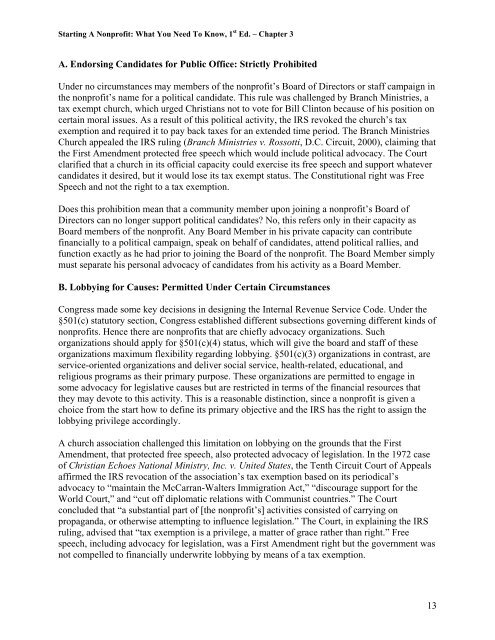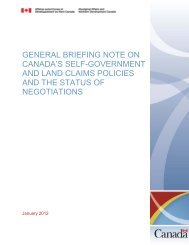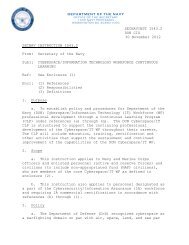HowToFormANonprofit_1st_ed-Chapter3
HowToFormANonprofit_1st_ed-Chapter3
HowToFormANonprofit_1st_ed-Chapter3
You also want an ePaper? Increase the reach of your titles
YUMPU automatically turns print PDFs into web optimized ePapers that Google loves.
Starting A Nonprofit: What You Ne<strong>ed</strong> To Know, 1 st Ed. – Chapter 3<br />
A. Endorsing Candidates for Public Office: Strictly Prohibit<strong>ed</strong><br />
Under no circumstances may members of the nonprofit’s Board of Directors or staff campaign in<br />
the nonprofit’s name for a political candidate. This rule was challeng<strong>ed</strong> by Branch Ministries, a<br />
tax exempt church, which urg<strong>ed</strong> Christians not to vote for Bill Clinton because of his position on<br />
certain moral issues. As a result of this political activity, the IRS revok<strong>ed</strong> the church’s tax<br />
exemption and requir<strong>ed</strong> it to pay back taxes for an extend<strong>ed</strong> time period. The Branch Ministries<br />
Church appeal<strong>ed</strong> the IRS ruling (Branch Ministries v. Rossotti, D.C. Circuit, 2000), claiming that<br />
the First Amendment protect<strong>ed</strong> free speech which would include political advocacy. The Court<br />
clarifi<strong>ed</strong> that a church in its official capacity could exercise its free speech and support whatever<br />
candidates it desir<strong>ed</strong>, but it would lose its tax exempt status. The Constitutional right was Free<br />
Speech and not the right to a tax exemption.<br />
Does this prohibition mean that a community member upon joining a nonprofit’s Board of<br />
Directors can no longer support political candidates? No, this refers only in their capacity as<br />
Board members of the nonprofit. Any Board Member in his private capacity can contribute<br />
financially to a political campaign, speak on behalf of candidates, attend political rallies, and<br />
function exactly as he had prior to joining the Board of the nonprofit. The Board Member simply<br />
must separate his personal advocacy of candidates from his activity as a Board Member.<br />
B. Lobbying for Causes: Permitt<strong>ed</strong> Under Certain Circumstances<br />
Congress made some key decisions in designing the Internal Revenue Service Code. Under the<br />
§501(c) statutory section, Congress establish<strong>ed</strong> different subsections governing different kinds of<br />
nonprofits. Hence there are nonprofits that are chiefly advocacy organizations. Such<br />
organizations should apply for §501(c)(4) status, which will give the board and staff of these<br />
organizations maximum flexibility regarding lobbying. §501(c)(3) organizations in contrast, are<br />
service-orient<strong>ed</strong> organizations and deliver social service, health-relat<strong>ed</strong>, <strong>ed</strong>ucational, and<br />
religious programs as their primary purpose. These organizations are permitt<strong>ed</strong> to engage in<br />
some advocacy for legislative causes but are restrict<strong>ed</strong> in terms of the financial resources that<br />
they may devote to this activity. This is a reasonable distinction, since a nonprofit is given a<br />
choice from the start how to define its primary objective and the IRS has the right to assign the<br />
lobbying privilege accordingly.<br />
A church association challeng<strong>ed</strong> this limitation on lobbying on the grounds that the First<br />
Amendment, that protect<strong>ed</strong> free speech, also protect<strong>ed</strong> advocacy of legislation. In the 1972 case<br />
of Christian Echoes National Ministry, Inc. v. Unit<strong>ed</strong> States, the Tenth Circuit Court of Appeals<br />
affirm<strong>ed</strong> the IRS revocation of the association’s tax exemption bas<strong>ed</strong> on its periodical’s<br />
advocacy to “maintain the McCarran-Walters Immigration Act,” “discourage support for the<br />
World Court,” and “cut off diplomatic relations with Communist countries.” The Court<br />
conclud<strong>ed</strong> that “a substantial part of [the nonprofit’s] activities consist<strong>ed</strong> of carrying on<br />
propaganda, or otherwise attempting to influence legislation.” The Court, in explaining the IRS<br />
ruling, advis<strong>ed</strong> that “tax exemption is a privilege, a matter of grace rather than right.” Free<br />
speech, including advocacy for legislation, was a First Amendment right but the government was<br />
not compell<strong>ed</strong> to financially underwrite lobbying by means of a tax exemption.<br />
13





